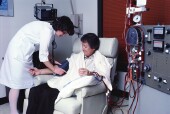
THURSDAY, April 15 (HealthDay News) — The U.S. cancer clinical trials system is nearing a “state of crisis” and needs to be repaired if gains in cancer treatment are going to continue, says a new government report.
The report, commissioned by the U.S. National Cancer Institute (NCI) and conducted by the Institute of Medicine (IOM), calls for a major revamping of the current system, including an injection of what they say is much-needed funding, along with reductions in bureaucratic red tape.
“The system is not broken but it could be doing a lot more if it were working better,” said Dr. John Mendelsohn, chair of the committee that prepared the report and president of the University of Texas M.D. Anderson Cancer Center in Houston.
“The problems articulated by the Institute of Medicine are very real and they do create a troubling paradox,” added Dr. Louis M. Weiner, director of the Georgetown Lombardi Comprehensive Cancer Center in Washington, D.C., who has been a member of the cooperative trials program most of his career.
“In an era where we have more understanding of cancer and how to attack it by going after particular targets and combinations of targets, and have a larger number of credible candidate drugs and concepts to test than at any other time, yet we have a regulatory and operational system that can’t get out of its own way,” he said. “It’s just a tremendous shame.”
“The consequence is that people will suffer and die needlessly because we haven’t been able to effectively get new treatments into the marketplace where they belong,” Weiner added. “What we see in the cancer world is probably a harbinger of what’s likely to happen elsewhere.”
The NCI-supported Clinical Trials Cooperative Group Program is comprised of more than 3,100 institutions and 14,000 investigators overseeing trials involving more than 25,000 patients each year. It is the largest clinical trials network in the nation.
“Cooperative groups have made tremendous contributions, especially looking at new uses for approved therapies and combining novel agents that come from different sponsors, and looking at rare diseases,” Mendelsohn said. “The most glorious example is all the cooperative group trials in pediatrics that led to changing the prognosis in childhood leukemia from a six months median survival to a cure rate above 75 percent.”
But such victories could be in danger, a result of funding cuts, inefficiencies and other problems, the IOM report said. Since 2002, for instance, funding for the program has plummeted by 20 percent.
The report, titled A National Cancer Clinical Trials System for the 21st Century: Reinvigorating the NCI Cooperative Group Program, identified four major areas of concern.
The first was the sheer amount of time it takes to set up a trial.
“We’ve learned that it takes more than two years for the average trial to be finalized, to write the trial,” Mendelsohn said. “If a trial takes more than a couple of years to develop, it rarely finishes. It becomes out of date, new things come along. If you’re going to do trials, you should be able to design them in less than a year, get them out and do them.”
The second goal involves making greater use of scientific innovation — such as biomarkers that can more quickly predict a tumor’s response to a drug — in clinical trials. That means that, instead of doing a trial on just breast cancer patients, researchers might select breast, colon and lung cancer patients who all had the same tumor mutation.
The report authors also want to explore ways in which two or three drugs could be used in combination to combat a particular type of cancer. For example, the IOM is recommending that the U.S. Food and Drug Administration help speed the process by which experimental drugs can be used, alone or together, without sacrificing patient safety.
The third goal involves identifying and supporting those trials that have the greatest chance of success and making sure they make it through to completion. “There are a number of ways we can centralize credentialing and improve [participant] enrollment approaches,” Mendelsohn said.
Finally, the report pointed out that both patients and physicians need to be better compensated for their participation in clinical trials so they’ll be motivated to participate.
One idea: make sure that public and private health plans cover the full expense to patients of participating in a clinical trial. “Patients are sometimes turning down trials because they’re worried they won’t be reimbursed for care, whereas if they took the standard therapy that might not work as well, they can be sure it will be paid for,” Mendelsohn explained. “The new health-care bill includes provisions for [covering] the non-experimental care in a clinical trial.”
Weiner added: “It’s a big challenge. There are a lot of competing constituencies and a lot of competing priorities. It is a difficult river to navigate but every one of the stakeholders wants to do what’s right for people who suffer from cancer and that can be highly motivating. [But] I don’t think it’s a matter of reshuffling processes to be more efficient. This is going to require a decision by society that clinical trials are important.”
More information
The U.S. National Cancer Institute has more on the cooperative trials program.

